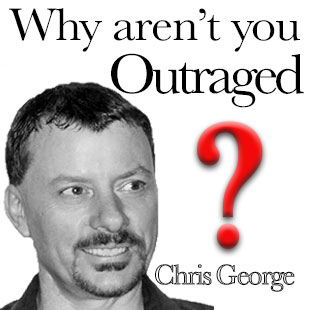
(CHRIS GEORGE / iNFOnews.ca)
December 05, 2017 - 12:41 PM
OPINION
A couple of years ago I ran for the Greens in a federal election. I recently went back through the posts on my Facebook campaign page. It is remarkable how little has changed on the policy front, primarily in economics and foreign policy, compared to the previous regime's agenda.
The 2015 federal election was a great example of Canadian politics in action. The cynicism of voting against what you hate, the abandonment of voting for what you know is right, and the ever present goad to voters of "splitting the vote" were all in evidence.
The masters of this latter tactic were the NDP and it is rather fitting that in many ridings, including ours, they were ultimately the ones who cost the Liberals a seat and allowed the Conservatives another victory. It is interesting to see the Conservatives and Liberals in P.E.I. now facing each other across this same tactic in their recent provincial by-election.
With all of the focus on "Stop Harper", it was a constant struggle to keep people talking about the issues of the day. And these were issues that needed to be discussed. Implementing Bill C-51, passing the TPP, building pipelines, not addressing climate change, eliminating the long form census, prosecuting the "war" on science, and opposing proportional representation were all issues being championed by the Harper government. They were also issues that the other parties had all set in their sites as opportunities to gain support from Canadians during the election.
Canadians, for example, are still mainly opposed to the Conservative position on Bill C-51 and many of these other issues. We made it clear by electing a Liberal majority government that we wanted change. Other issues also played into the defeat of the Conservatives, of course. The ill treatment of Islamic refugees, ignoring human rights, attempting to exploit "barbaric cultural practices" for votes; all played a role in keeping moderate voters away from their brand.
Change was promised. Change was campaigned on. Change even made it as far as the mandate letters given to every cabinet minister in the new Liberal government. The only place change hasn't appeared is in legislation or in bold, new initiatives from the current government. The Liberals have been busy, don't get me wrong. But busy, not with the issues that Canadians thought they were going to get busy with, but with issues that weren't really part of their campaign.
The human rights record of Canadian corporations overseas hasn't changed. Supporting morally indefensible court battles against First Nations hasn't changed. And after taking a hard look at the top of mind issues listed above, not much has changed on many of them, either.
Start with the so called war on science. While some progress has been made on this front, it strikes me as mainly cosmetic, with much of the long term Conservative position yet to be addressed. The return of the long-form census and supporting legislation has been welcome, but there are still challenges to be met that seem to be receiving little or no attention. The current status and long term fate of federal libraries for example.
The sudden allergy to proportional representation is the current poster boy for similarities between the Conservatives and the Liberals. Both were staunch supporters of the idea while in opposition, to the point where the Liberals felt they had to promise it during the election to co-opt the momentum being built in the NDP, Green, and activist communities on this issue. That they have chosen not to deliver shouldn't be a surprise to anyone.
The TPP is on again. The Kinder Morgan pipeline, according to the federal government, is going to happen, no matter what people in British Columbia might think. Canadians are still protesting Bill C-51.
There is more, but isn't this enough for us to question whether we really changed governments in 2015? Sure, there have been some notable reversals on a few issues. But it is the inaction on the big ticket items that should capture our attention. Conservatives will make much of the narrow differences between them and the Liberals on matters economic and political, but mainly they will focus their campaign attention on the vast gulfs between the two parties on social issues to really differentiate themselves. Liberals will always campaign left and govern right. But do these election strategies really fairly represent all Canadians when it comes to our political economy?
It seems that an argument could be made that these issues and both government's positions on them are the same because that position is what is best for Canadians. I don't think that is the case, not given how most Canadians feel about these issues. In Canada we are lucky to have somewhat escaped the duopoly trap that our neighbours to the south have fallen into. We have actual third parties here, parties that represent a politics that doesn't share the exact same vision for Canadian political economy that our two corporate parties do.
We have options, in other words. 2019 is coming, and maybe, just maybe, this will be the election where the voters remember how the ball got yanked away from their foot at the last second in 2015 and refuse to fall for the mantra of "don't split the vote" and actually vote for what they want instead of who they hate the worst.
I'm not putting any money on it.
— Chris George believes one measure of a just society is found in how well it balances fiscally conservative economics with social responsibility and environmental soundness in all of its living arrangements.
We welcome your comments and opinions on our stories but play nice. We won't censor or delete comments unless they contain off-topic statements or links, unnecessary vulgarity, false facts, spam or obviously fake profiles. If you have any concerns about what you see in comments, email the editor.
News from © iNFOnews, 2017